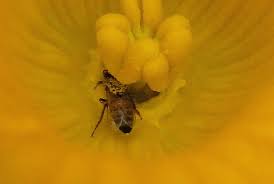Squash nectaries refers to the nectaries found in squash plants. Nectaries are specialized glands that produce nectar, a sugary substance, which is attractive to pollinators like bees, butterflies, and other insects. In squash plants, nectaries play a crucial role in attracting these pollinators, facilitating the process of pollination and subsequently leading to fruit formation.
The nectar produced by squash nectaries serves as a reward for pollinators, encouraging them to visit the flowers, collect pollen, and transfer it to other flowers, promoting cross-pollination. Cross-pollination is essential for squash plants to produce healthy and abundant fruit.
The Economic Importance and Uses of Squash Nectaries

Squash nectar, derived from the squash plant, primarily refers to the sweet, nutrient-rich liquid found within the plant’s flowers. While squash nectar itself is not a widely recognized or commonly utilized commercial product, squash plants play a vital role in agriculture and ecosystems, providing various economic and ecological benefits:
1. Food Production and Nutrition: Squash plants, including their nectar, produce edible fruits that are an important source of nutrition for humans. Squash is rich in vitamins, minerals, and dietary fiber, making it a valuable part of a balanced diet.
2. Agricultural Economy: The cultivation of squash for its fruits contributes to the agricultural economy. Farmers and growers can sell squash fruits in local markets, grocery stores, or directly to consumers. The economic activity generated from squash farming supports livelihoods and sustains the agricultural sector.
3. Biodiversity and Ecosystem Health: Squash plants, like many other flowering plants, play a crucial role in supporting pollinators such as bees, butterflies, and other insects. The nectar produced by squash flowers attracts pollinators, facilitating pollination and thereby enhancing crop yields for various other plants in the area.
4. Soil Health and Fertility: Squash plants, through their roots and organic matter, help improve soil structure, nutrient content, and water retention capacity. This is vital for sustainable agriculture and long-term soil health.
5. Companion Planting and Crop Rotation: Squash can be used in companion planting strategies to enhance the growth and yield of other crops. For example, intercropping squash with other vegetables can help deter pests and improve overall soil health.
6. Livestock Feed: Squash plants, including their leaves and stems, can be used as livestock feed, contributing to the agricultural sector and livestock industry.
7. Research and Education: Squash plants are used in botanical and agricultural research to study plant growth, genetics, and potential agricultural improvements. Educational institutions use squash plants as teaching aids to educate students about plant biology and agricultural practices.
Read Also: Squash Anthers: Economic Importance, Uses, and By-Products
8. Horticultural Value: Squash plants are often grown for their ornamental value in gardens and landscapes. The attractive flowers and fruits make squash a popular choice for ornamental horticulture, enhancing the aesthetic appeal of gardens and public spaces.
The Products and By-products That Can Be Derived From Squash Nectaries
Squash nectaries, which are specialized glands on the flowers of squash plants, produce nectar as their primary product. This nectar serves as a reward for pollinators like bees and butterflies, encouraging them to visit the flowers and aid in pollination. However, beyond nectar, squash nectaries do not directly produce other commercially significant products or by-products.
Here’s a breakdown of the primary product and its uses:
1. Nectar: Nectar is the primary product of squash nectaries. It is a sugary liquid produced by plants and is the main attractant for pollinators. Nectar contains sugars (glucose, fructose, and sucrose), amino acids, vitamins, minerals, and organic acids. Bees and other pollinators collect nectar to use as a source of energy for their own activities and for producing honey. In commercial agricultural settings, the presence and accessibility of nectar are crucial for successful pollination and fruit development in squash crops.
2. Honey Production: Bees collect nectar from squash flowers to produce honey. While squash nectar itself is not a primary honey source, it can contribute to the overall honey production in a bee’s foraging area. Honey is a valuable agricultural product used for consumption and various industrial and culinary purposes.
3. Enhanced Fruit and Seed Production: Successful pollination resulting from the presence of nectar leads to increased fruit and seed production in squash plants, indirectly contributing to the overall yield and quality of squash crops.
4. Biodiversity Support: Squash nectaries, by providing nectar, support a diverse array of pollinators, which is vital for maintaining healthy ecosystems and supporting other plant and animal species.
5. Enhanced Crop Yield and Quality: Nectar production by squash nectaries attracts and rewards pollinators, ensuring effective pollination. Successful pollination is essential for the formation of fruits and seeds in squash plants, leading to a higher crop yield and improved fruit quality.
6. Biodiversity and Ecosystem Health: Squash nectar supports a diverse community of pollinators, including bees, butterflies, moths, and other insects. This biodiversity is crucial for a healthy and balanced ecosystem. Pollinators play a significant role in pollinating other plants in the surrounding area, promoting overall biodiversity and ecological stability.
7. Economic Impact: The presence of nectar in squash flowers contributes to the overall economic viability of agricultural systems. A successful squash crop depends on effective pollination, and this can directly impact the livelihoods of farmers and the economic outcomes of agricultural operations.
In conclusion, while squash nectaries primarily produce nectar as their main product, the indirect benefits resulting from nectar production are fundamental to the success of squash crops and the overall health of ecosystems. These benefits include enhanced crop yield and quality, biodiversity support, and economic impact within the agricultural sector.

